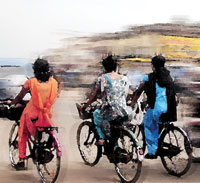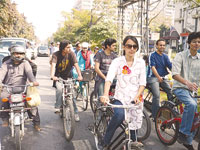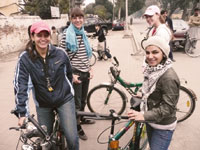Gearing up for a bicycle ride
Women cannot cycle on the streets of Lahore. It's considered indecent. But can this mindset be changed?
By Sabahat Zakariya
Picture the scene: A handful of men and women plying the Lahore roads on a leisurely Sunday. Nothing all that unusual about it you would say, until you were told that those men and women are on bicycles. Men of a certain background in society are almost as rare a phenomenon on city streets as are women, and Critical Mass, Lahore tries to break these taboos every single lazy Lahori Sunday.


Like many girls my age I had enthusiastically bicycled around my small colony as a young child but as I grew to two digits, hushed tones and glances made me retreat into non-cycling mode for the rest of my life. It was simply not considered decent for girls to do anything that would detract from single-mindedly following the path to domestic felicity, and since cycling did not in any way seem to contribute to that directly, it had to be chucked away.
Ironically though, women from an older generation faced less social stereotypes in this regard. We have all heard stories of mums and aunts who cycled down the Mall Road and made their way to Kinnaird College on a bicycle. But somehow, somewhere things changed. Women slowly disappeared from the public space and seeing them out and about on city streets became a rare phenomenon.
When asked about this, my mother told me that she used to bicycle every day from her village to main Sialkot city to attend her Bachelors classes at her college during the '60s and never faced harassment or even raised eyebrows.
When asked about this, my mother told me that she used to bicycle every day from her village to main Sialkot city to attend her Bachelors classes at her college during the '60s and never faced harassment or even raised eyebrows.
Critical Mass, therefore, is a God sent in a social environment where defying norms is always best done with a pinch of prudence. So having heard of Critical Mass from a friend, one fine Sunday morning I stashed my borrowed bicycle in the trunk of my car and set off towards Zakir Tikka, the starting point for the Critical Mass rides. It was a relief to see that some other brave women had also showed up with their bicycles and were willing to be a part of the phenomenon. That first ride proved that there was far less cause for apprehension than I had first imagined.
Tikka, the starting point for the Critical Mass rides. It was a relief to see that some other brave women had also showed up with their bicycles and were willing to be a part of the phenomenon. That first ride proved that there was far less cause for apprehension than I had first imagined.
 Tikka, the starting point for the Critical Mass rides. It was a relief to see that some other brave women had also showed up with their bicycles and were willing to be a part of the phenomenon. That first ride proved that there was far less cause for apprehension than I had first imagined.
Tikka, the starting point for the Critical Mass rides. It was a relief to see that some other brave women had also showed up with their bicycles and were willing to be a part of the phenomenon. That first ride proved that there was far less cause for apprehension than I had first imagined.
There was surprisingly little harassment on the roads and though people certainly did look up and stare, none of the women felt threatened. It may be because in this case the class divide overwhelmed the gender divide. Upper middle class looking women on bicycles, surrounded by men, inspire enough shock and awe to stun onlookers into silence. Unsurprisingly, my most conservative comments have come from men of an upper social strata who have expressed distaste at the idea of 'respectable' women making a spectacle of themselves around town, frowning upon their courage to revel in feeling lose-limbed and free.


If bicycling comes back into vogue it can prove to be a great boon for women of poorer backgrounds. Once the streets are made safe for them by ensuring that both male and female police do their duty in curbing harassment, cleaning ladies can save a great deal of money while commuting from one house to another in order to earn their meagre wages. It might also help dissuade the culturally accepted but unsafe and dangerous practice of women sitting side-saddle on motorbikes.
Cycling, for me, has led to all sorts of adventures. From a gruelling six-hour trek to Jallo Park and back to shouting down the PM's motorcade in protest for blocking city roads for hours. It has also helped forge many new friendships, since cycling is not just conducive to interacting with one's environment but also with other people in a refreshing new way.
Lahore is the ideal city for bicycling, what with its wide, tree-lined boulevards and a history of cultural leadership. Imagine it being flooded with men and women of all types riding on bicycles, lessening the city's smog and giving its roads a refreshing sense of civility and fair play.
Women, let's ride the wave and change the cityscape.
Women, let's ride the wave and change the cityscape.
No comments:
Post a Comment